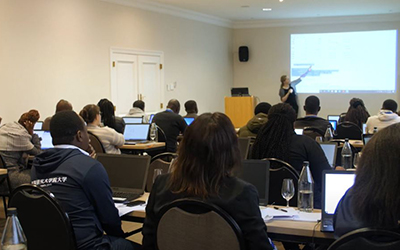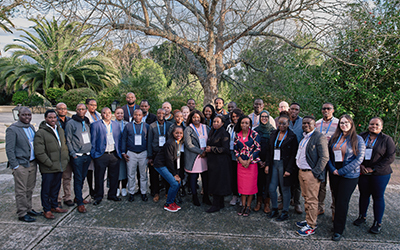Blog
Empirical research is crucial for better tax enforcement in the developing world
I had the privilege to participate in the UNU-WIDER Winter School as one of the lecturers. In this blog, I explain my main takeaways for students and why I found this capacity development initiative important and urgent. Having more data, particularly on tax avoidance in African countries, brings great opportunities for tax revenue mobilization.
For a long time now my main research interest has been the challenge of taxing multinational firms in less developed countries. This topic is important, formidable, and interesting for multiple reasons.

We know that countries in the Global South want to gain more tax revenues to achieve greater financial independence —instead of relying on donations or loans from other countries — to be able to provide more and better social services and support systems for their citizens, and to support sustainable economic growth. But in the current situation multinational firms often get away without paying their fair share of taxes to these countries.
Developing countries face a difficult trade-off
Raising the level of tax revenues collected in these countries has proven to be easier said than done. When it comes to raising revenue from big multinational firms, developing countries often face a fierce trade-off.
On the one hand, countries want to attract big firms and investments. They benefit from the well-paid jobs that these companies create and from knowledge spillovers to the local economy. Empirical evidence shows that corporate tax provisions are instrumental to increase foreign direct investment. Consistent with this evidence, many countries have established so-called special economic zones (SEZs), that feature special low corporate tax rates for firms that relocate there, to foster foreign direct investments.
On the other hand, multinationals, as the largest firms in developing nations, can be a source of significant revenues. Their tax payments shape aggregate revenue collection and the associated provision of much-needed public goods and services.
Profit shifting strategies by multinational firms that strip income from high-tax nations and shift it to low-tax countries are therefore a thorn in the side of governments, which struggle to collect tax revenues. Over recent years, many governments have implemented measures to prevent taxable profits generated in their country from being extricated. Just recently, many low-income countries joined the internationally coordinated effort to constrain profit shifting by the OECDs’ Base Erosion and Profit Shifting project.
But, in many cases, this has led to tensions and an inconsistent mix of policy instruments — some that offer tax incentives to attract multinational firms, and others that aim to increase the effective tax burden of these firms by limiting profit shifting behaviour.
Great opportunities now available to tackle the challenges
 At the UNU-WIDER Winter School course on tax policy research, I covered the empirical evidence on the taxation of multinational firms in less developed countries. The reflections in my lecture included the impact of taxes on the behaviour of multinational firms, the extent of profit shifting to low-tax countries, channels used to shift profits, and the effectiveness of governments’ countermeasures.
At the UNU-WIDER Winter School course on tax policy research, I covered the empirical evidence on the taxation of multinational firms in less developed countries. The reflections in my lecture included the impact of taxes on the behaviour of multinational firms, the extent of profit shifting to low-tax countries, channels used to shift profits, and the effectiveness of governments’ countermeasures.
These are pressing issues. While a lack of high-quality data has prevented analysing these questions in the context of developing nations for years and decades, more and more tax authorities on the African continent have recently started to allow researchers to access the tax administrative data needed to do empirical research in this area. Access to data brings great opportunities to shed light on the tax revenue and real economic effects of different corporate tax instruments. This evidence provides guidance for policymakers that aim to design beneficial corporate tax policies for their countries.
A course bigger than its size
 The Winter School course brought together a magnificent group of leading researchers and students from all over Africa to learn about the state of tax and development-related research. The course also allowed us to exchange ideas about research questions, data sources available in students’ host countries, and the design of empirical strategies.
The Winter School course brought together a magnificent group of leading researchers and students from all over Africa to learn about the state of tax and development-related research. The course also allowed us to exchange ideas about research questions, data sources available in students’ host countries, and the design of empirical strategies.
For me, the course was a stimulating event with terrific interaction with a young and ambitious group of scholars in the beautiful surroundings of Stellenbosch, South Africa. As a result of the encounter, I am currently drafting a proposal with one of these students to work on a joint project and obtain some funding for his PhD.
For me the UNU-WIDER Winter School has already proven to be a course bigger than its curriculum alone. At best it can spark a remarkable change in revenue authorities all around Africa, and can help to design corporate tax systems that appropriately balance the need for revenue and the need for investments for the benefit of low-income countries.
The views expressed in this piece are those of the author(s), and do not necessarily reflect the views of the Institute or the United Nations University, nor the programme/project donors.
 Join the network
Join the network








